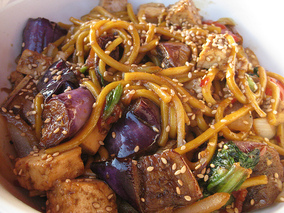
Safe at any speed/A UU photographer
Once I rode in the Pride Parade in a motorized cable car for seniors. It was my first time to participate. Last year, I was a wheel monitor for the Unitarian Universalist truck of musicians from the Oakland UU. I was in charge of the right rear wheel, mostly to be sure no one fell under it. I can’t say trudging along in the exhaust of the truck was as much fun or made me as proud as when I rode with other older women, waving at people who cheered and laughed when they read our sign, “Two, four, six, eight, what makes you think your grandma’s straight.”
And despite missing the parade this year, officiating at a wedding in the redwoods in Lagunitas, I feel proud that I and the gay and straight parade participants and cheerers who line Market year after year support the inclusion of all people whatever their sexual proclivities and activities.
When I first considered pride, I did so because the then-minister was preaching about each sin. Because I am familiar with all seven, I was part of the service and had my four minutes as Worship Associate. Doing my research at the time, I found that Wickipedia called pride the deadliest of the seven sins, the one from which the other six flow. Furthermore, hardly anyone has escaped the admonishment that pride goeth before a fall. As I learn more about eastern traditions, I worry less about any of the seven including this deadliest one, pride, and pay more attention to grasping or pushing away.
But since yesterday was Pride Parade in San Francisco, I am inclined to think about pride and what makes me most proud of myself. I’d have to say it is my humility.
In the days of having a significant other, I recall a conversation like this. I am introduced to my girlfriend’s friends, one of whom says to me, “I hear you are a writer.” Rather than a thoughtful response, a pause or an inquiry, I stiffen, unhappy with a ready-made label, even if it is positive and something I could be proud of. Really priding myself on abhorring labels, I say solemnly, “A writer is someone who writes. Do you see me writing?” Following the silence, the conversation veers away, sparing me embarrassing questions like “Have you been published?” What do you think of Joyce Carol Oates?”
I grew up in a family that said achievement and honors signal superiority. Over the years, family bragging solidified in me anti-aggrandizing strategies to ward off feelings of inferiority and self-loathing, as none of my accomplishments seemed big or important enough. Sundays at the Cousins’ Club I remember how my Uncle Ben would regale the rest of us with his son, my cousin’s, accomplishments. He’s been appointed chair of an English Department. He’s had a book published, and it’s the story of my father’s life. What have I done lately?
Of course, accounts of other family members’ superior achievements can inspire children to seek and earn acclaim, preferably punctuated by trophies, prizes or certificates of merit. But these accounts can also have the opposite effect. In my case, from childhood up, tales of superior family accomplishments created an urge in me to try to accomplish nothing worth bragging about. Perhaps a kind of false modesty more than the real thing.
It’s been my experience that fragile egos like mine do one of two things, neither of which looks or sounds like pride or humility. We may hunker down behind a barrier built for protection, a false case of don’t show and don’t tell. Behind such a barrier resentment builds each time nobody notices or listens.
On the other hand, fragile egos can catalog their accomplishments for a very long time, taking every conversational break as an opportunity to detail their splendor. To these people, I am willing to listen for five minutes and no longer. Apparently the biblical admonishment not to hide one’s light under a bushel has passed the candle stage and become a neon sign with pulsing arrows that end in a big “me.”
I don’t know which is worse or less interesting, listening to others belittle their accomplishments, or bragging on and on. In either case, I don’t have the energy or interest, no matter how kind I wish to be. But I don’t consider the wonderful sense of accomplishment we feel when we have done the right thing to be a deadly sin at all. I’m sure the ancients had more heinous crimes in mind when composing their list of sins and calling the worst one pride.
In fact, once pride became an operating principle in my life rather than just a five-letter word, I realized that there is actually plenty of praise, prizes, and pride to go around. If I want to, I can write a book about my father’s life and publish it myself. And next year as I ride or walk in the parade in spirit or in fact, I will celebrate my own as well as everybody else’s accomplishments no matter how big or small.
And despite missing the parade this year, officiating at a wedding in the redwoods in Lagunitas, I feel proud that I and the gay and straight parade participants and cheerers who line Market year after year support the inclusion of all people whatever their sexual proclivities and activities.
When I first considered pride, I did so because the then-minister was preaching about each sin. Because I am familiar with all seven, I was part of the service and had my four minutes as Worship Associate. Doing my research at the time, I found that Wickipedia called pride the deadliest of the seven sins, the one from which the other six flow. Furthermore, hardly anyone has escaped the admonishment that pride goeth before a fall. As I learn more about eastern traditions, I worry less about any of the seven including this deadliest one, pride, and pay more attention to grasping or pushing away.
But since yesterday was Pride Parade in San Francisco, I am inclined to think about pride and what makes me most proud of myself. I’d have to say it is my humility.
In the days of having a significant other, I recall a conversation like this. I am introduced to my girlfriend’s friends, one of whom says to me, “I hear you are a writer.” Rather than a thoughtful response, a pause or an inquiry, I stiffen, unhappy with a ready-made label, even if it is positive and something I could be proud of. Really priding myself on abhorring labels, I say solemnly, “A writer is someone who writes. Do you see me writing?” Following the silence, the conversation veers away, sparing me embarrassing questions like “Have you been published?” What do you think of Joyce Carol Oates?”
I grew up in a family that said achievement and honors signal superiority. Over the years, family bragging solidified in me anti-aggrandizing strategies to ward off feelings of inferiority and self-loathing, as none of my accomplishments seemed big or important enough. Sundays at the Cousins’ Club I remember how my Uncle Ben would regale the rest of us with his son, my cousin’s, accomplishments. He’s been appointed chair of an English Department. He’s had a book published, and it’s the story of my father’s life. What have I done lately?
Of course, accounts of other family members’ superior achievements can inspire children to seek and earn acclaim, preferably punctuated by trophies, prizes or certificates of merit. But these accounts can also have the opposite effect. In my case, from childhood up, tales of superior family accomplishments created an urge in me to try to accomplish nothing worth bragging about. Perhaps a kind of false modesty more than the real thing.
It’s been my experience that fragile egos like mine do one of two things, neither of which looks or sounds like pride or humility. We may hunker down behind a barrier built for protection, a false case of don’t show and don’t tell. Behind such a barrier resentment builds each time nobody notices or listens.
On the other hand, fragile egos can catalog their accomplishments for a very long time, taking every conversational break as an opportunity to detail their splendor. To these people, I am willing to listen for five minutes and no longer. Apparently the biblical admonishment not to hide one’s light under a bushel has passed the candle stage and become a neon sign with pulsing arrows that end in a big “me.”
I don’t know which is worse or less interesting, listening to others belittle their accomplishments, or bragging on and on. In either case, I don’t have the energy or interest, no matter how kind I wish to be. But I don’t consider the wonderful sense of accomplishment we feel when we have done the right thing to be a deadly sin at all. I’m sure the ancients had more heinous crimes in mind when composing their list of sins and calling the worst one pride.
In fact, once pride became an operating principle in my life rather than just a five-letter word, I realized that there is actually plenty of praise, prizes, and pride to go around. If I want to, I can write a book about my father’s life and publish it myself. And next year as I ride or walk in the parade in spirit or in fact, I will celebrate my own as well as everybody else’s accomplishments no matter how big or small.


 RSS Feed
RSS Feed